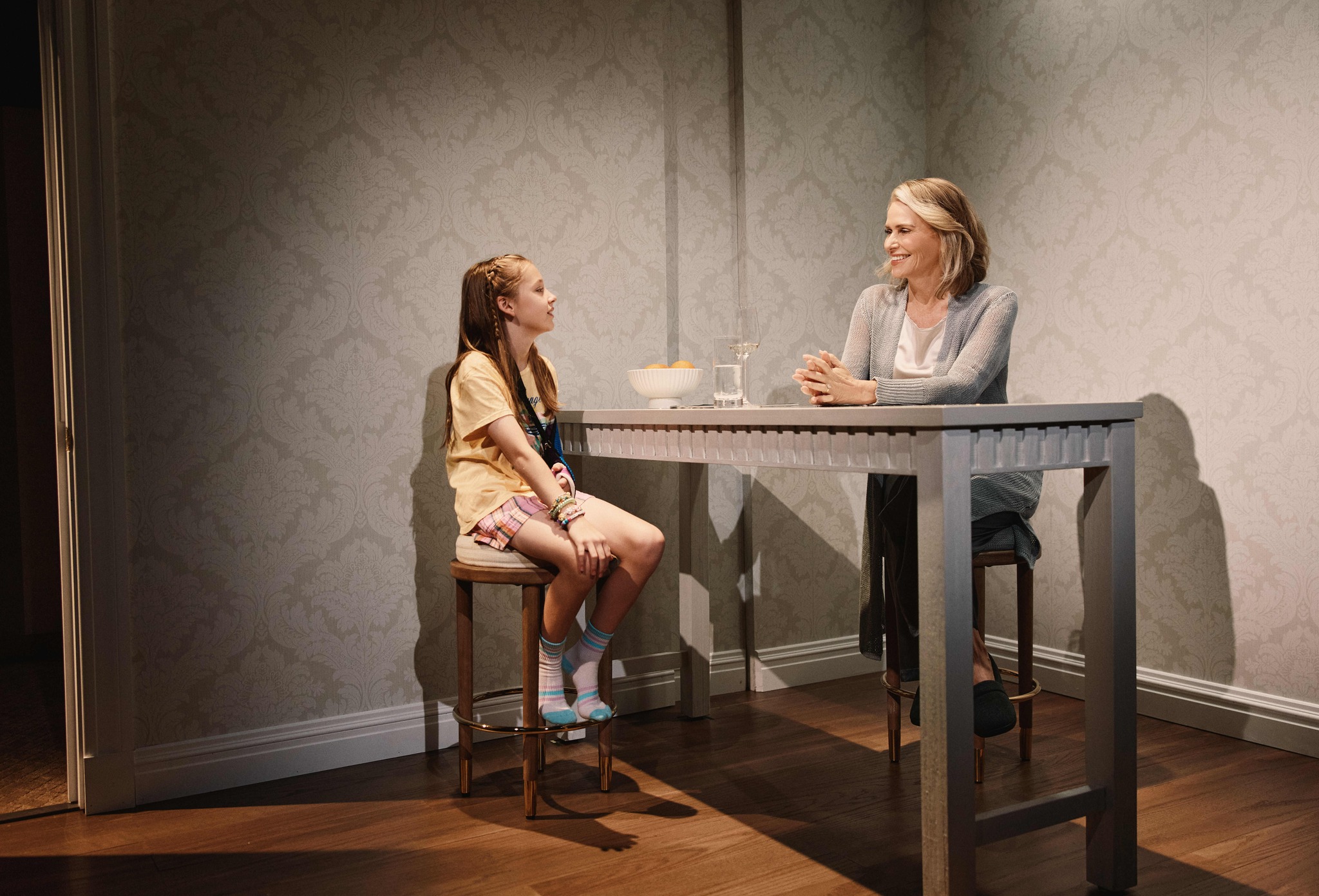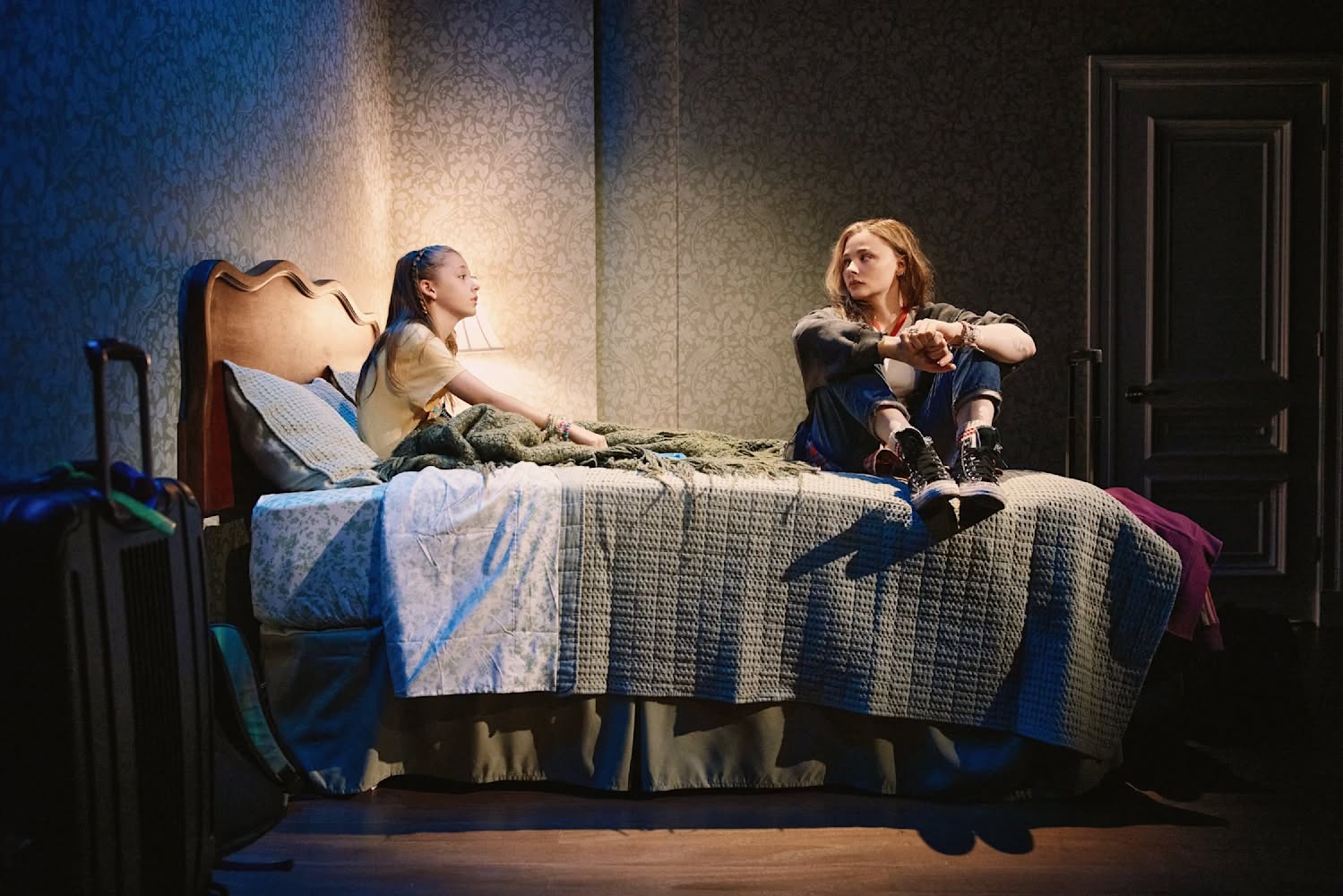
River Lipe-Smith and Amy Landecker in Caroline. Photo: Emilio Madrid.
Caroline is a sneaky little play: playwright Preston Max Allen sets you up to brace for one kind of wrenching and uncomfortable family drama, and then takes an entirely different route to ripping your heart out. When we meet Maddie (Chloë Grace Moretz), a twenty-something mom, and her tween daughter (River Lipe-Smith) at a diner, they’ve got suitcases piled in the corner next to the booth: they’re in motion from somewhere to somewhere else, and it doesn’t seem like a lighthearted vacation. The kid’s got a cast on one arm; she’s milking her mom’s obvious guilt over letting her child get hurt, but there’s a little genuine fear there too—as there is in Maddie’s face every time her phone alerts to a text.
As they talk, we quickly learn, via Maddie gently nudging her daughter to announce her new name–Caroline–that the girl is trans. The incident that broke Caroline’s arm is also the thing that’s forced Maddie to step firmly over the line between accepting her child for who she is and trying to protect her by soft-pedaling that truth in an increasingly hostile world. Puberty is on the horizon–Maddie mentions at one point that Caroline is about to age out of coed gymnastics–so all of the decisions that come with transitioning medically are about to get real, and West Virginia is seeming like an increasingly bad place to make those decisions.
But, especially after leaving the boyfriend who hurt her kid, Maddie is hitting her limits financially. She’s a recovering addict who’s been estranged from her family for Caroline’s entire life (Caroline is surprised to learn she even has parents of her own); Caroline’s father died a number of years back in an “accident” that may or may not have been an overdose; and while Maddie’s been working hard, she doesn’t have the financial wherewithal to move on the spur of the moment to a place where it will be safe for Caroline to transition–and also to pay for that care. Which means she’s headed back to the suburban Chicago home of her rich parents: parents she ran away from and stole from multiple times in the throes of addiction, parents who blocked her number years ago and don’t know they have a grandchild.
We think we see where this is going: This cool millennial mom, with her plaid flannel and ripped jeans and her fondness for hardcore music and her life of striving to stay clean, is going to bring her trans kid home and grapple with the bigotry of her uptight, wealthy parents; young Caroline is going to spend the play having to justify her right to exist. But that’s not it at all. Rhea (Amy Landecker)—polished, poised, and rigidly tasteful—is totally cool with her bright, emotionally mature trans granddaughter: eager, even, to welcome Caroline, who reminds her of Maddie before her life spiraled into addiction. It’s her daughter—eight years sober but still far from living the college-to-career-to-suburbia lifestyle Rhea imagined—who provokes her knee-jerk reactions and unleashes all her judgmental barbs. Because while Maddie is eight years sober, Caroline is nine years old, and from that simple math, Rhea draws the unshakable conclusion that “one day at a time” might fail once more, and that’s not a risk she’s willing to take—again. Nothing Maddie says can break through the tough-love barricades Rhea set up when Maddie was a troubled fourteen-year-old; nothing Rhea says can assuage the feelings of betrayal Maddie felt as that fourteen-year-old being shuffled off to rehab after rehab without ever feeling heard or understood. And so the big emotional conflict of the piece–though the painful political complexities of parenting or being a trans kid are never far from the surface–plays out in Rhea and Maddie’s fractured relationship, even as Caroline’s well-being is the prize they’re playing for.
Maddie’s father remains in the picture but does not appear in the play; he’s on a business trip, so it’s just the three generations of women trying to come to a detente they can all live with: an arrangement that may not be possible when neither Maddie nor Rhea can afford to let the other trespass painfully constructed boundaries. Maddie needs to prioritize her health over living the life, or being the person, her mother imagined for her; Rhea needs to prioritize her own emotional safety after the emotional/physical/financial wreckage of Maddie’s adolescence. Maddie can’t trust that Rhea won’t abandon Caroline if she stops being the “perfect little girl” the same way Maddie did; Rhea can’t trust that Maddie won’t fail Caroline with even the tiniest slip back into drug or alcohol use.
The unfussy matter-of-fact-ness with which the production treats Caroline is a breath of fresh air in this moment that puts such a painful spotlight on trans kids. She’s a vibrant, bratty, scheming, thoughtful, complex kid, like any other. Her obstacles ahead are not minimized, and she’s exquisitely focused on navigating them—to the point of suggesting that her mother forge a birth certificate so she could “just be a girl” without being tied to her birth gender–but they don’t outweigh her joy at simply being Caroline at last. The challenges she’s already faced are acknowledged, too, but all of this is just the texture of this particular family’s life, and Allen makes the details, both positive and negative, specific and lived-in: Little disciplinary challenges over school bathrooms. Acting-out behavior. The easy acceptance by Caroline’s friends. Maddie’s excessive work hours as a manager at PetSmart. Worry about leotards as bodies start to mature.
Rhea, Maddie, and Caroline have a few scenes all together, but most of the piece is a series of tight two-person conversations, and the success of the production hinges hugely on its casting and its performances, which are fortunately all rich with nuance and emotional shading. One would not expect otherwise in the hands of director David Cromer–or indeed at MCC, founded as it is by casting director Bernie Telsey–but the family portrait here feels unusually complete. There’s a resemblance among the three, sure, but it’s more than that; there are all kinds of echoes in the subtleties of their physical performances that link them, even when their overall emotional registers are so different. I kept finding myself noticing micro-expressions in Landecker and Moretz’s eyebrows; the subtle efforts all three make to hold emotional control when they’re screaming inside; how much it costs each of them when that control slips. Maddie talks about her struggle to be simply present every day, and you feel that in Moretz’s performance, how she calculates the potential risks to her hard-won safety and to her ability to parent her child at every turn. And while Landecker’s Rhea is not a villain, but a person who’s been hurt too many times to ever feel safe again, you also feel a buried vindictiveness in her. If Moretz’s quiet, steely control sometimes gives way to anguish, Landecker’s icy polish cracks to reveal rage.

River Lipe-Smith and Chloë Grace Moretz in Caroline. Photo: Emilio Madrid
Production elements, too, help to draw these characters for us. David Hyman’s costumes and Robert Pickens’s hair and wig design tell us so much: Caroline’s collection of barrettes and sparkly sneakers; Maddie’s half-laced Converses and messy buns; Rhea’s tidy pastel cardigans perfect cool blond hair with every strand in its place. And Christopher Darbassie’s music-filled sound design charts the relationship between Maddie and Caroline, who have mildly disdainful patience for each other’s taste–and plays up the gap between them and Rhea’s music-free home.
Of course, Caroline depends greatly on the casting of Caroline herself, and River Lipe-Smith carries the weight with a rich performance that belies their young age. They do have a bit of the preternatural poise that you often see in a child actor, but in David Cromer’s expert hands, this becomes part of the personality of Caroline, a child who has to have a degree of intentionality to her every action that isn’t average for a fourth-grader, both as the child of an addict and as a trans kid. Their Caroline is guarded but joyful; fiercely protective of her mother and willing to battle for herself.
In the end, the showdown between Rhea and Maddie is resolved by a choice made by Caroline–in a conclusion that reinforces Allen’s overall assertion that Caroline is just fine in a way that’s perhaps not entirely convincing in the world as it is. It might not even be entirely convincing with where the play leaves Maddie and Rhea–but it’s good to end on that note of hope anyway.
